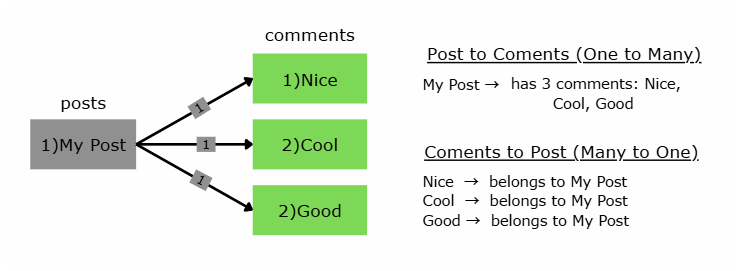Advertisement
Google Ad Slot: content-top
One To Many & Many To One
What is One To Many?
- Definition: One record in a table can have multiple related records in another table.
- Example:
- One Post → can have many Comments.
- (A blog post can receive many comments from users.)
Post → Comments
What is Many To One?
- Definition: The reverse of One To Many.
- Example:
- Many Comments → belong to One Post.
- (Each comment is always related to one specific post.)
Comments → Post
Flow diagram

Migration:
Use this command to generate a migration for creating a tables:
php artisan make:migration create_onetomany_manytoone_tables
Migration File
public function up(): void
{
Schema::create('posts', function (Blueprint $table) {
$table->id();
$table->string('title');
$table->timestamps();
});
Schema::create('comments', function (Blueprint $table) {
$table->id();
$table->foreignId('post_id')->constrained()->onDelete('cascade');
$table->string('body');
$table->timestamps();
});
}
public function down(): void
{
Schema::dropIfExists('comments');
Schema::dropIfExists('posts');
}
Run Migration
php artisan migrate
Tables
| id | title | created_at | updated_at |
|---|
| id | post_id | body | created_at | updated_at |
|---|
post_id is the foreign key connecting Comments → Posts.
Model:
Generate a model with Artisan:
php artisan make:model Post php artisan make:model Comment
This generates 2 files Post.php and Comment.php
Post.php
namespace App\Models;
use App\Models\Comment;
use Illuminate\Database\Eloquent\Model;
class Post extends Model
{
protected $fillable = ['title'];
// One Post has Many Comments
public function comments()
{
return $this->hasMany(Comment::class);
}
}
Comment.php
namespace App\Models;
use App\Models\Post;
use Illuminate\Database\Eloquent\Model;
class Comment extends Model
{
protected $fillable = ['post_id', 'body'];
// Each Comment belongs to One Post
public function post()
{
return $this->belongsTo(Post::class);
}
}
CRUD Examples
Create
use App\Models\Post; // Create a Post $post = Post::create(['title' => 'My Post']); // Add Comments to that Post $post->comments()->create(['body' => 'Nice']); $post->comments()->create(['body' => 'Cool']); $post->comments()->create(['body' => 'Good']); // Method 2 Using Eloquent instance $post2= new Post(); $post2->title= "My Second Post"; $post2->save(); // Add Comments to that Post $post2->comments()->create(['body' => 'This is Greate']); $post2->comments()->create(['body' => 'Thank you.']);
| id | title | created_at | updated_at |
|---|---|---|---|
| 1 | My Post | 2025-08-17 20:38:58 | 2025-08-17 20:38:58 |
| 2 | My Second Post | 2025-08-17 20:38:58 | 2025-08-17 20:38:58 |
| id | post_id | body | created_at | updated_at |
|---|---|---|---|---|
| 1 | 1 | Nice | 2025-08-17 20:38:58 | 2025-08-17 20:38:58 |
| 2 | 1 | Cool | 2025-08-17 20:38:58 | 2025-08-17 20:38:58 |
| 3 | 1 | Good | 2025-08-17 20:38:58 | 2025-08-17 20:38:58 |
| 4 | 2 | This is Greate | 2025-08-17 20:38:58 | 2025-08-17 20:38:58 |
| 5 | 2 | Thank you. | 2025-08-17 20:38:58 | 2025-08-17 20:38:58 |
👉 Here, post_id is automatically set in the comments.
Read
use App\Models\Post;
use App\Models\Comment;
// Get all comments for a post
$post = Post::find(1);
foreach ($post->comments as $comment) {
echo $comment->body;
}
// Get the post for a specific comment
$comment = Comment::find(1);
echo $comment->post->title; // "My Post"
Update
use App\Models\Post; use App\Models\Comment; // Update a comment $comment = Comment::find(1); $comment->body = "Updated comment text"; $comment->save(); // Update post and its comments $post = Post::find(1); $post->title = "Updated Post Title"; $post->save();
Delete
use App\Models\Post; use App\Models\Comment; // Delete a single comment Comment::find(1)->delete(); // Delete a post → all its comments will also be deleted (cascade) Post::find(2)->delete();
Eager loading (optimizes queries)
use App\Models\Post;
use App\Models\Comment;
// Get all comments for a post
$post = Post::with('comments')->find(1);
foreach ($post->comments as $comment) {
echo $comment->body;
}
// Get the post for a specific comment
$comment = Comment::with('post')->find(1);
echo $comment->post->title; // "My First Post"
Always use with() when fetching related data in bulk.